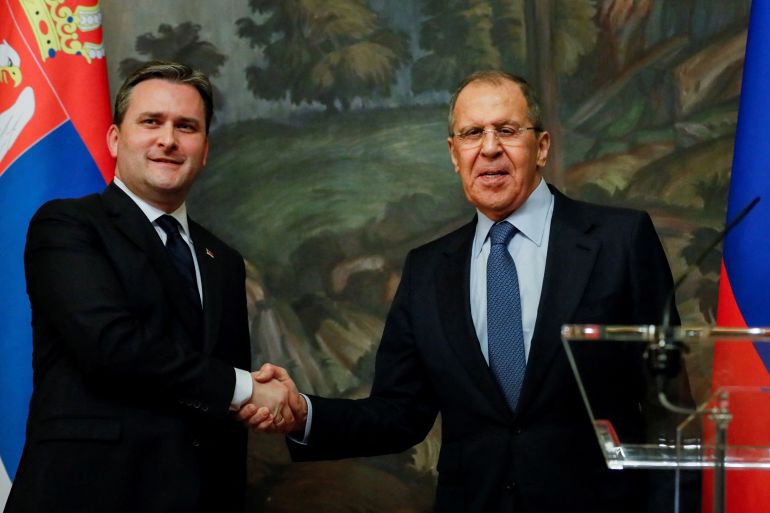EU, US question Serbia’s EU commitment after Russia deal
West questions Belgrade after signing a deal with Moscow pledging long-term consultations on foreign policy.

The European Union and the United States have questioned Serbia’s proclaimed commitment to join Europe’s 27-nation bloc after Belgrade signed an agreement with Moscow pledging long-term “consultations” on foreign policy matters amid Russia’s war in Ukraine.
Serbia’s officials signed the deal on Friday in New York with Russian Foreign Minister Sergey Lavrov on the sidelines of the United Nations General Assembly, where most Western delegations shunned Russia’s top diplomat over the country’s invasion of Ukraine.
Keep reading
list of 4 itemsSerbia secures gas deal with Putin, as West boycotts Russia
Russia’s Lavrov cancelled visit a ‘diplomatic scandal’ for Serbia
Serbia, Kosovo leaders hold talks in Brussels amid tensions
Serbian Minister of Foreign Affairs Nikola Selakovic signed the document dubbed a “plan on consultations”. He said the plan envisages consultations on bilateral and multilateral activities, though there was nothing on security policies in it. Serbian opposition parties criticised the document.
Serbia’s foreign ministry has sought to downplay the importance of the signed agreement, saying it is a “technical” one and relates to bilateral ties and not security issues.
Although Serbia said it supports Ukraine’s territorial integrity, its right-wing government has repeatedly refused to join Western sanctions against Slavic ally Russia. Aligning foreign policies with the EU is one of the main conditions for joining the bloc, but Serbia has increasingly defied calls to do so.
The news of the deal triggered harsh criticism from both EU and US officials.
European Commission spokesman Peter Stano warned on Monday that Serbia’s relations with Russia cannot be “business as usual” under the current circumstances when Moscow is violating the UN Charter with its armed forces committing atrocities in Ukraine.
“It’s a very clear sign of their intention to strengthen their ties, to further strengthen relations between Serbia and Russia and this is raising serious questions,” he said. “We are taking this very seriously and we are following this up.”
US Ambassador to Serbia Christopher R Hill said “further alignment with Russia is a step in the wrong direction and contrary to Serbia’s stated European aspirations”.
“The United States believes that no country should be expanding cooperation with Russia while it continues its war of aggression against Ukraine,” Hill said in a statement to The Associated Press news agency.
“News of this agreement signed with Russia was surprising and stands in stark contrast with other constructive meetings in New York with Serbian officials.”
Under the 10-year rule of Serbian populist leader Aleksandar Vucic, a former ultranationalist, Serbia has been steadily sliding away from its proclaimed EU goals and establishing close political ties with Russia.
Ivana Stradner, adviser for the Washington, DC-based Foundation for Defense of Democracies, said on Twitter that the consultations between Belgrade and Moscow are “one more of Vucic’s balancing game between Washington and Moscow“.
“Did he also tell them about the NATO exercise next week?” Stradner said.
Today Serbia & Russia signed the Plan of Consultations for 2023-2024. One more Vucic’s balancing game between Washington and Moscow..so this is a new video for his far right “Z 🇷🇺” supporters voters. Did he also tell them about NATO exercise next week? 🙂pic.twitter.com/ls0bw3wW1s
— Ivana Stradner 🇺🇸🇺🇦 (@ivanastradner) September 23, 2022